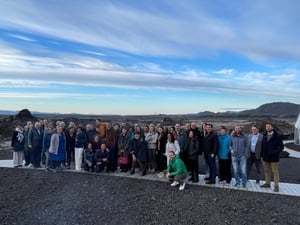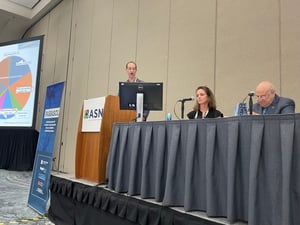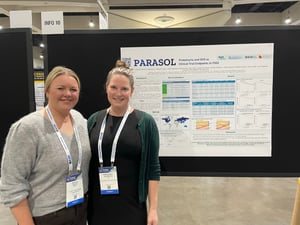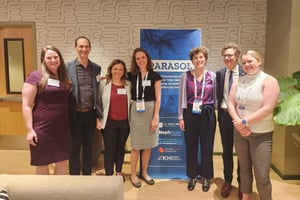
PARASOL
Proteinuria and Other Biomarkers as Endpoints for Clinical Trials in Kidney Disease
PARASOL-FSGS
The original PARASOL project is an international collaborative effort aiming to define quantitative relationships between short-term changes in key biomarkers and long-term outcomes in FSGS patients, with the goal of supporting surrogate endpoints as a basis for drug approval pathways in the future.
In 2024, the PARASOL group achieved a major milestone by conducting an analysis based on the largest combined dataset to date of patient-level longitudinal data in FSGS, incorporating data from multiple continents including observational cohort studies, regional or national registries, or real-world data sets.
PARASOL-FSGS is co-sponsored by several leading organizations in kidney health: The Food and Drug Administration (FDA), NephCure, the International Society of Glomerular Disease, the Kidney Health Initiative (ASN), and the National Kidney Foundation (NKF). A dedicated team from the Michigan Kidney Translational Medicine Center at the University of Michigan supported the project as the data coordinating center.
The consortium continues its work on assessing endpoints in FSGS given the growth of that dataset, with publication anticipated in late 2025.
Please visit the dedicated PARASOL FSGS page for a deeper look into the findings and progress resulting from the 2024 analysis.
PARASOL Project Expands Focus to Include APOL1 Kidney Disease, Primary Membranous Nephropathy
The organizing committee of PARASOL (PROTEINURIA AND OTHER BIOMARKERS AS ENDPOINTS FOR CLINICAL TRIALS IN KIDNEY DISEASE) is pleased to announce that the PARASOL Project will extend its efforts to investigate potential clinical trial endpoints for two additional kidney diseases with significant unmet needs: APOL1 kidney disease and primary membranous nephropathy (PMN), including the association of anti-PLA2R antibodies. Both projects will be operationally coordinated by the ISGD. NephCure, the Kidney Health Initiative (ASN), and the NKF will also continue their roles as overall project sponsors.
ABOUT THE PROJECTS
Endpoints for APOL1 Kidney Disease
APOL1 kidney disease (also known as AMKD for APOL1-mediated or APOL1-modified kidney disease) is a rapidly progressive category of proteinuric kidney disease modified by high-risk variants of the apolipoprotein L1 gene. Genetic testing has shown that a significant proportion of various kidney disease diagnoses involve an underlying APOL1 variant, including FSGS, viral-associated nephropathy, and hypertension. A high-risk APOL1 genotype also contributes to progression in other autoimmune kidney diseases and diabetic kidney disease.
Outcomes are poor: patients with a high-risk APOL1 genotype experience onset of kidney disease earlier in life, leading to a median age of kidney failure of 45.1 years. There is no currently approved drug that specifically targets APOL1 kidney disease, but interventional trials are ongoing.
In 2025, Rosenberg et al. analyzed ARIC, CRIC, and AASK cohorts, showing eGFR and UPCR at 3 years predict kidney failure, though further validation is needed. The PARASOL group with expertise in global data and endpoint evaluation, together with international APOL1 experts, is advancing this effort.
Primary Membranous Nephropathy and Anti-PLA2R Antibodies
In January 2023, NephCure hosted a workshop on anti-PLA2R antibodies in membranous nephropathy, with proceedings published in 2025. Key needs identified were clarifying aPLA2R’s role as a biomarker, regulatory pathways for its use in drug development, applications in trial design (inclusion, monitoring, endpoints), and refining proteinuria-based endpoints. These insights will guide future therapeutic development in PMN.
PARASOL will leverage the project’s infrastructure and processes to explore the potential for aPLA2R to be used as a surrogate endpoint for clinical trials and a qualitative marker for monitoring disease severity, as well as expanding the data-driven understanding of other potential proteinuria-based endpoints for PMN trials.
References
-
Rosenberg AT, Flaherty C, Anderson AH, Appel LJ, Coresh J, He J, Lash JP, Liu C, Rao PS, Taliercio J, Surapaneni A, Grams ME; CRIC Study Investigators. Surrogate End Points in Apolipoprotein L1 - Associated Kidney Disease : Evaluation in Three Cohorts. Clin J Am Soc Nephrol. 2025 Jan 1;20(1):23-30. doi: 10.2215/CJN.0000000000000575. Epub 2024 Nov 5. PMID: 39499577; PMCID: PMC11737446.
-
Prunotto M, Nachman PH, Gillespie BS, Beck LH Jr, Thompson AM, Hu AH, Stafford EA, Tarnoff JM, Rovin BH. Designing Clinical Trials for the Treatment of Membranous Nephropathy in the Anti-Phospholipase A2 Receptor 1 Era: Results of a NephCure Membranous Nephropathy Workshop. Glomerular Dis. 2025 Mar 14;5(1):133-141. doi: 10.1159/000544808. PMID: 40092585; PMCID: PMC11908811
Organization and Project Structure
ISGD and all PARASOL stakeholders remain committed to collaboratively advancing patient care in glomerular diseases through multi-stakeholder collaboration and analysis of shared data. As with PARASOL-FSGS, collaboration and data sharing among multiple stakeholders will be crucial to project success. In alignment with the previous project structure, the projects will include three key meetings (kickoff, interim, and public consensus) and will follow a timeline of approximately one year.
PARASOL-MN will be chaired by Patrick Nachman (University of Minnesota) and Tobias B. Huber (UKE Hamburg), with PARASOL-FSGS chairs Laura Mariani and Matthias Kretzler (both University of Michigan) as well as Brad Rovin (Ohio State University) serving as senior advisors.
PARASOL-AMKD will be chaired by Laura Mariani (University of Michigan), Rulan Parekh (University of Toronto), and Keisha Gibson (University of North Carolina) with Matthias Kretzler (University of Michigan) as a senior advisor.
The University of Michigan will serve as the data coordinating center, with Abigail Smith (Northwestern University) leading the data analysis for AMKD and Jarcy Zee (University of Pennsylvania) leading the data analysis for PMN.
The PARASOL team welcomes collaboration from other interested parties. For more information about the PARASOL project and how to participate, please visit the project website or contact the steering committee at parasol@is-gd.org.
ORGANIZING COMMITTEE
- Matthias Kretzler, MD, University of Michigan (Co-Chair)
- Laura Mariani, MD, MSCE, FASN, University of Michigan (Co-Chair)
-
Laurence Beck, MD, PhD, Boston Medical Center
-
Laurel Damashek, MA, International Society of Glomerular Disease
-
Hailey Desmond, MS, University of Michigan
-
Keisha Gibson, MD, University of North Carolina at Chapel Hill
-
Barbara Gillespie, MD, Fortrea; Adjunct Professor, UNC
-
Margaret Helmuth, MA, University of Michigan
-
Tobias B. Huber, MD, International Society of Glomerular Disease and University Medical Center Hamburg-Eppendorf
-
Alex Mercer, PhD, JAMCO Pharma Consulting
-
Patrick Nachman, MD, University of Minnesota
-
Rulan Parekh, MD, MS, FRCPC, Sick Kids Hospital
-
Abigail Smith, PhD, Northwestern University
-
Josh Tarnoff, NephCure
-
Aliza Thompson, MD, MS, FDA
-
Howard Trachtman, MD, University of Michigan
-
Melissa West, American Society of Nephrology (Kidney Health Initiative)
-
Kerry Willis, PhD, National Kidney Foundation
-
Jarcy Zee, PhD, University of Pennsylvania
CONTACT THE PROJECT TEAM
Please contact the PARASOL team at parasol@is-gd.org if you have any questions about the project, are interested in contributing data, or would like to participate in another way.









.png?width=300&name=NKF%20clear%20background%20(2000%20x%20500%20px).png)